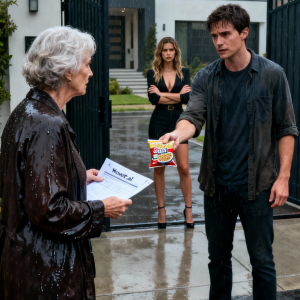
There are three things worth knowing about me before anything else: my name is Margaret, I’m thirty-six years old, and my house is the single achievement in my life that feels truly, entirely mine.
It isn’t a mansion perched on a cliffside, nor a sleek townhouse with glass walls and marble floors. It’s an ordinary brick home tucked along a quiet street in Brighton, Oregon, and yet to me it glows brighter than any palace. I bought it without anyone’s help—no inheritance, no partner with a larger paycheck to share the burden. I made the down payment after years of night shifts, of skipping vacations, of saying no to dinners out while balancing two jobs at once. The day the keys slid into my hand, I wept in the parking lot of the bank, not out of exhaustion but from the breathtaking relief of knowing I had finally carved out a corner of the world for myself.
But ownership was only the beginning. The house had strong bones, yet it needed heart, and I was determined to give it one. Weekends disappeared into sanding baseboards, replacing light fixtures, and comparing paint swatches until my eyes blurred. I saved for furniture piece by piece, refusing to rush. The living room eventually became a gentle palette of ivory walls and sage green fabrics, sunlight catching the edges of the curtains like watercolor. Every detail had been chosen slowly, carefully, with love.
The backyard, though, was my pride. I dug the beds myself and planted climbing roses in crimson and pale pink, lavender that perfumed the air by midsummer, and clematis vines trained along the wooden pergola. Some mornings I sat beneath it with coffee, listening to the quiet rustle of leaves, feeling that for once in my life I was not chasing time—it was moving with me.
So when my younger sister Helena called, her voice high and urgent, I already felt my chest tighten.

“Margaret, I’m desperate,” she blurted. “Every venue’s either booked solid or costs a fortune. Couldn’t we use your house for Oliver’s birthday? Just this once? You’re not going to say no, are you?”
I hesitated. I was leaving town for a weekend trip, and the thought of strangers filling my rooms unsettled me. But then I pictured Oliver—seven years old, freckle-faced, grinning every time he shouted “Aunt Maggie!”—and my resistance weakened. He adored me, and I adored him. To disappoint him would feel like tearing something inside myself.
“Please be careful,” I said at last, my voice smaller than I intended. “I’ve worked hard to make this place a home.”
“You’ll never even know we were there,” Helena promised breezily. “It’ll be perfect.”
I wanted to believe her.
Two days later, when I pulled into the driveway, a sick dread pooled in my stomach. A sagging balloon clung to the fence, the front door hung ajar, and the first step inside confirmed my worst fears. The rug I had saved for was splattered with soda stains in violent purple and red. The cream sofa was buried under crumbs, sticky fingerprints streaked the hallway walls, and the glass vase I had bargained for at a flea market lay shattered in the corner.
The kitchen reeked of grease and sugar. Pizza crusts, paper plates, and soda bottles were abandoned in piles, and the sink overflowed with dishes. When I opened the fridge, a collapsed birthday cake smeared across the shelves stared back at me like a cruel joke.
But the backyard was the true wound. My roses had been ripped out of the soil entirely, tossed into a muddy heap. Candy wrappers tangled in the lavender, balloons dangled from the pergola, and the once-soft grass was a churned battlefield of mud.

I called Helena, my hands shaking.
“My house is ruined,” I whispered.
Her response was a sigh. “Don’t exaggerate. It was just a children’s party. You wouldn’t understand—you don’t have kids.”
The words struck like a slap. I reminded her of her promise, of my trust. She laughed it off. Then, sharper, she added, “Maybe you shouldn’t cling so tightly to a house you don’t even share with anyone. Oliver deserved a celebration in a place like that. You don’t need it.”
I hung up before I said something that couldn’t be unsaid.
The days that followed were mechanical. I hired cleaners, only to be told the rug and sofa were beyond saving. I spent more than three thousand dollars restoring what could be restored. The garden required landscapers, new roses, resealing the pergola, replacing warped furniture. Each receipt felt like a tally of betrayal. Helena never offered to help.
Weeks later, she called again—this time furious. A pipe had burst in her kitchen, flooding the house. Repairs, she claimed, would cost thousands. She accused me of cursing her, of seeking revenge. In truth, I felt no triumph, only emptiness. Fate had evened the scales, but there was no satisfaction in it.
The silence between us stretched. Yet Oliver remained a bright thread. He still visited, watering the new roses with a toy watering can, laughter echoing as though nothing had been lost. Once, kneeling by the blooms, he looked up at me and said, “These are even prettier than before.”
And in that moment, I understood. The garden, like me, had been broken and rebuilt. Stronger. Different, but still beautiful.
Now, when I host friends under the pergola with candles and food I’ve cooked myself, I feel a fragile peace settle over me. My house is more than walls and furniture. It is proof that I can begin again, and that I will never let anyone strip it from me.
Home, I’ve learned, is not simply where you live. It’s where you decide to stand guard over your own heart.




